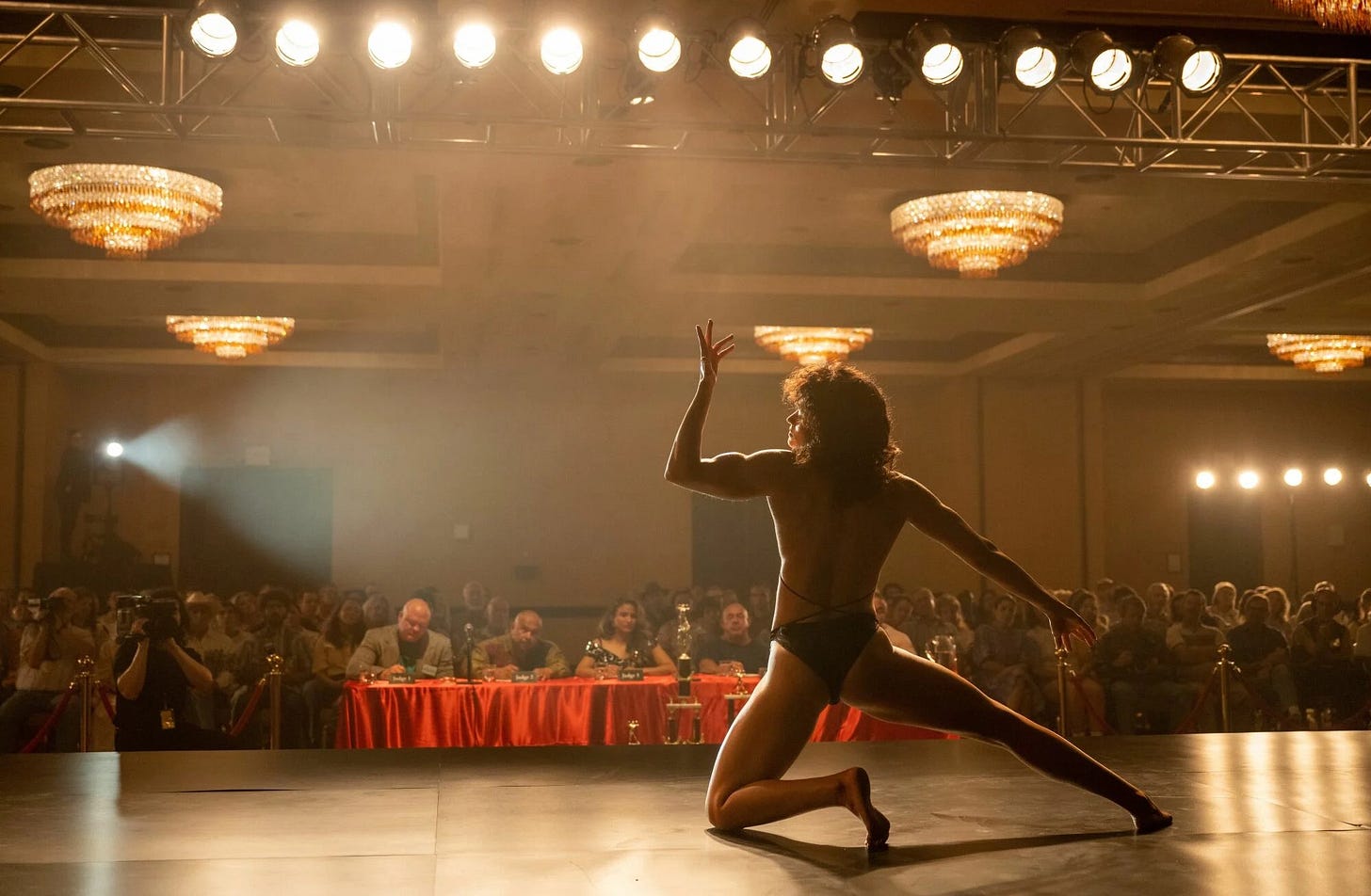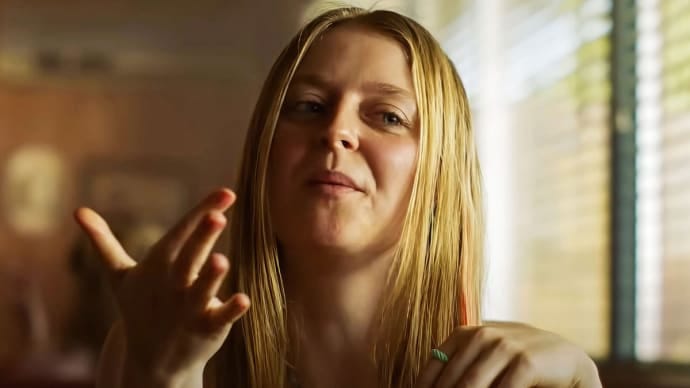'Love Lies Bleeding': Locked & Loaded with Gender Fuckery + Bodily Fluids
It’s a good year for badly behaved queers.
In many ways, Love Lies Bleeding (dir. by Rose Glass) is unlike anything I’ve ever seen before. A stylishly unchic sexcapade – the film is grotesque, violent, brain-melting, jaw-blowing, and damn sexy. Rose Glass’s sophomore feature is a masterclass in worldbuilding. Set in the New Mexico desert and fueled by desperation, lust, and the American Dream, Love Lies Bleeding is a surrealist sapphic fever dream. This lesbian revenge thriller is thick, wet, and pungent. It serves you a hungry plate of viscera and sex that will stay with you even after the credits stop rolling.

The film opens with a harsh portrait of a 1989 American gym, drifting across a sea of sweating bodies on ellipticals, swole muscles pumping iron, and tenets of Gym scripture reading: “NO PAIN NO GAIN”, “ONLY LOSERS QUIT”, and “PAIN IS WEAKNESS LEAVING THE BODY” – slogans reminiscent of the fitness craze obsession of the era—my worst nightmare. Glass sets this story amidst a sea of aching desperation, everyday people seeking to push their bodies beyond the max in chase of something better, something idealized. The sequence comes to an end with a grody visual of a shit-clogged toilet in the gym bathroom: a promise of more unsettling visuals to come. Lou (played by Kirsten Stewart) is the gym manager on call, stuck with a long list of grunt work and responsible for unclogging said toilet. Lou is a small-town recluse whose primary ambitions lie in quitting smoking – which honestly, good for her. Her days are spent smuggling steroids to juiced up gym bros and avoiding the obsessive (and unhinged) Daisy (played by Anna Baryshnikov), along with a pair of FBI agents who have taken interest in her father, Lou Sr. (played by Ed Harris), the town’s local gun-running crime boss. Lou no longer speaks to her father and is desperate to be rid of him. In fact, the only thing keeping her in town is her concern for her battered sister Beth (played by Jena Malone), a complacent housewife who delusionally pines after her hot-and-cold abusive husband JJ (played by Dave Franco) – who, by the way, sports one of the most criminal-offense-worthy mullets I’ve seen since my days in art school.
Lou’s status quo is disrupted when she meets Jackie (played by Katy O’Brian), a fearless vagabond, hitchhiker, and hunky bodybuilder who drifts through town seeking work and a space to train for an upcoming competition in Las Vegas. The two kick start their fated romance afterhours in the gym when Lou offers Jackie her first try at steroids via injection, an intimacy that entangles the two for the remainder of the runtime. Though dangerous, the eroticism of foreplay via needles and hormonal biohacking isn’t lost on all audiences, especially not on queer and trans viewers. The scene is informed by a transsexually-coded spirit of gender-fuckery that the two characters carry deeply within them. Their passionate affair is held together by the promise in one another that life beyond patriarchal femininity is possible and life-affirming, even in this seedy town.
Their tryst ramps up in what my friend Chile (who watched alongside me in the theater) called the “fastest U-Haul I’ve ever seen”. After the two move in together, the film drives their relationship forward with an alluring and sordid portrait of their romance: heavy on mouth-watering montages filled with gun worship, chocolate and sweat dripping on skin, frantic sex, and bodybuilder show(wo)manship set in grungy living rooms. But when the couple finally settle into their love for one another, Lou’s family baggage begins to rear its head. Jackie starts working for Lou Sr. at the local gun range and abusive brother-in-law JJ leaves Beth in a gruesome state (having her bedridden in the hospital). Our protagonists begin to spiral through a series of unfortunate events, amplified by bad ‘roid rage, a string of violent murders, and a haphazard plot put together by Lou to expose the trail of bodies left behind by her father that have haunted her since her youth.
Love Lies Bleeding carries with it a pulpy yet grounded treatment of period storytelling – with amazing costumes and hair that are so unchic that they’re alluring, along with a masterfully crafted score helping to boldly welcome the viewer into its world. Avoiding caricaturing the 80s time period, the film instead focuses its attention on characterizing its setting of “Small-Seedy-Town”, New Mexico to contextualize the dysfunction, hunger, and anxiety that drives the chaotic decision-making of the film’s lived-in characters. But what stands out the most is the film’s immersive sound design and mind-altering score from Clint Mansel. Mansel’s sound is woven into the film’s DNA, acting as an all-consuming parasite that psychically tethers you to the disturbing psychosis that O’Brian’s Jackie begins to experience in the second half of the film. Mansel’s sound is vital to the storytelling here. It is an all-consuming heartbeat that intensifies as the stakes grow for our flawed heroes, allowing us to spiral along with them.

Despite its grim and slimy texture, the film is able to deliver on its dark humor, which becomes most evident in the running gag of Lou’s attempts to quit smoking throughout the film. Truly tragic, Stewart’s character is constantly being laughed at by this universe’s God, with packs of cigarettes falling out of pockets and purses from dead bodies that she keeps accidentally finding herself responsible for cleaning up. Indeed, Lou constantly gets the short end of the stick throughout the movie, and (except for when her toxic masculinity begins to show) you consistently feel sorry for her. Yet, it’s Stewart’s comic timing and her skillfully handled commitment to a frantic yet goofy delivery of her lines that inserts the fun and joy into what should otherwise be a hard-to-watch movie. Stewart’s praise for her work both on and off of Love Lies Bleeding is deserved and worth singing, yet the honest-to-God standouts of the film is Katy O’Brian’s performance as the juiced-up Jackie with a heart of gold. Her oiled musculature captures audiences on the film poster, yet I stayed for O’Brian’s characterization of Jackie’s free spirit. In addition, Anna Baryshnikov’s underrated performance as Daisy deserves all the shoutouts. Despite playing a relatively smaller character in the film, Baryshnikov’s Daisy is stressful. She’s lived-in, she’s tragic, and often, she’s painful to watch as she naively trails after Lou, dancing in circles whilst being gaslit by our protagonists & hilariously screwing up their plans left and right.
And yet, the film isn’t without its own set of issues. Glass’s direction and Mansel’s sound design are both exceptional storytelling devices, yet the plotting leaves you with many pressing questions that unfortunately go unanswered. At times it can feel that Glass prioritizes sensationalist visual storytelling over fleshing out the needed time to spend getting to really understand the film’s ensemble of unique characters. It works in favor of hooking an audience, but it’s most apparent when you leave the favor confused on what the fuck just happened. (For example: somehow Jackie has a little sibling that we find out about in the last half-hour of the film?) This isn’t always a problem for me though, given the film’s stronger choices and a masterful tactic in ‘showing, not telling’. Besides, pages left unturned often allow more room for the audience to fill in the blanks.
Glass’s Neo-Noir pastiche leans heavily on referencing genre predecessors but all with the intention of queering audience expectations. When faced with ongoing tropes of punishing women onscreen and the threat of a certain ‘sapphic doom’, Glass rejects realism in favor of a utopic queer finale that grants every yearning gay kid’s dream of a glamorous escape from their hometown, frolicking freely with chosen family and your head in the clouds. This choice of a magical realist twist (IFYKYK 🤫) won’t pay off with all audiences and for that reason alone, it’s a bold decision from Rose Glass and Weronika Tofilska (who both co-wrote the film’s screenplay). But one reason it pays off with me is that it stands out as a defiant ‘fuck-you’ to the genre’s treatment of transgressive women. The film’s deus ex machina ending may work against it for some, but for myself and many queer audiences, it screams as a love letter to stubborn lesbians who dare to dream big, leaving behind old narratives of powerless women, in efforts to carve out a new path, much like 1991’s Thelma & Louise.
Love Lies Bleeding is one violent and unhinged romp, one that will have you gagged, mind-blown, and stressed-the-fuck-out. With its lead characters running desperately toward freedom and chasing glimmers of a better life, the film feels like a spiritual successor to the Wachowski sisters’ 1996 Bound and even the 1995 erotic thriller Showgirls, landing itself as one of the most stylish and insane movies I’ve seen in a long time.





I also loved the finale!! I liked the subtle foreshadowing to it like the cartoon played near the beginning.
This is so good! I left the movie not really knowing how to feel but this summed all the chaos up so well! It is so beautiful and simultaneously gross/grimy. Love you’re style as well 🫶🏾